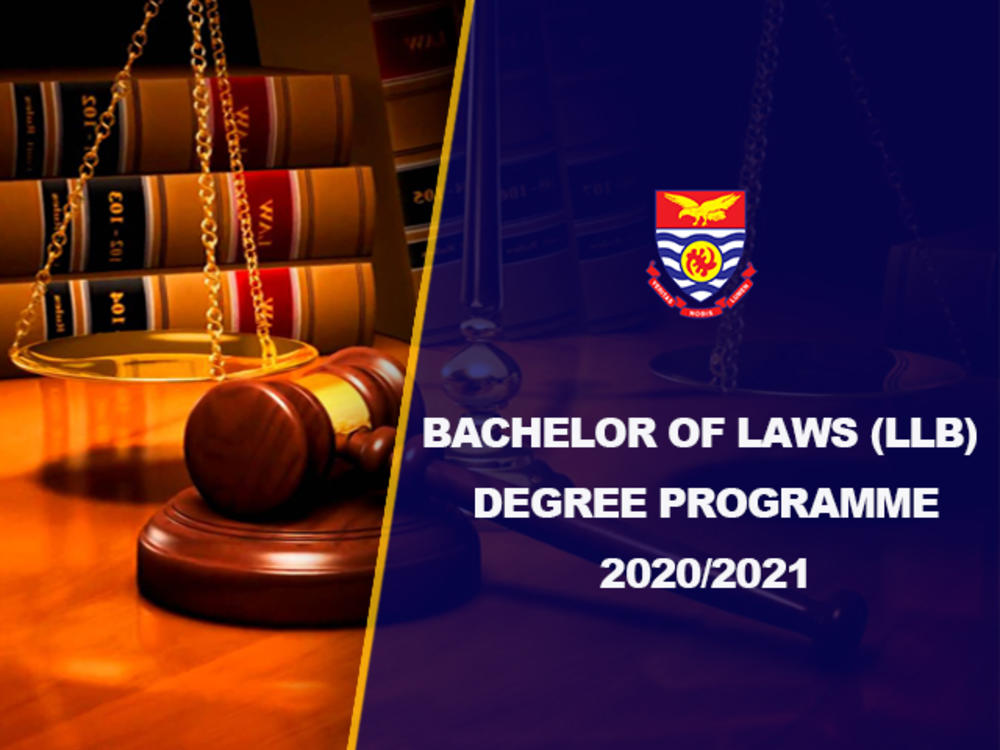ADMISSION OF CANDIDATES INTO THE BACHELOR OF LAWS (LLB) DEGREE PROGRAMME FOR THE 2020/2021 ACADEMIC YEAR
Applications are invited from suitably qualified persons (Ghanaian and Foreign) for admission into the 3-Year (Post-First Degree) and 4-Year (Post-WASSCE/SSSCE) Bachelor of Laws (LLB) degree programmes of the University of Cape Coast for the 2020/2021 academic year.
1.0 SALE OF APPLICATION E-VOUCHERS
Applicants should purchase e-vouchers for online application at the Centres listed below
1.1 Ghanaian Applicants
-
Cashier’s Office, University of Cape Coast (Mode of payment – CASH)
-
Ghana Post Offices at the Regional Capitals – (Mode of payment – CASH)
-
University of Cape Coast – Accra Office, Tesano – Accra (Mode of payment – CASH)
-
I-J Consult, Apostle Dr. Baidoo Avenue (Off Pentecost Convention Centre Road), Millennium City, Kasoa (Mode of payment – CASH)
-
GCB Bank (Mode of Payment - CASH)
-
ADB Bank (Mode of Payment - CASH)
-
GT Bank (Mode of Payment - CASH)
-
CBG Bank (Mode of Payment - CASH)
-
ZENITH Bank (Mode of Payment - CASH)
-
PRUDENTIAL Bank (Mode of Payment - CASH)
-
REPUBLIC Bank (Mode of Payment - CASH)
-
ARB Apex Bank (Mode of Payment - CASH)
1.2 Foreign Applicants
International applicants can make payment by VISA Card and have their e-voucher PIN and serial numbers sent to their e-mail addresses to enable them to complete their applications online.
1.3 Application Fee:
Ghanaian Applicants - GH¢220.00
International Applicants - US$100.00
Applicants are to note that they will be required to pay an additional fee to cover the cost of a selection examination and/or interview. The amount will be communicated to shortlisted applicants.
The deadlines for the sale of e-vouchers (Ghanaian applicants) and the submission of completed application forms (All applicants) are Monday, 20th April, 2020 and Friday, 24th April, 2020 respectively.
2.0 ENTRY REQUIREMENTS
3-Year Post-First Degree LLB Programme
Applicants must:
· Have obtained a good first degree in any field of study from a recognized University with at least a 2nd Class Honours (Lower Division) or a post-graduate qualification from a recognized University.
· Submit an official transcript of academic record.
· Submit at least two referees’ reports, one of which must be from a former lecturer.
· Pass a selection interview.
· Show capacity for a demanding full time study; availability by show of release letter from employers; and ability to pay fees
NB.: Ghanaian Applicants will be required to:
· Write an entrance examination
· Familiarize themselves with the provisions of the 1992 Ghanaian Constitution and current affairs (national and international)
· Have successfully completed national service.
Eligible foreign applicants (applying from outside Ghana) will be examined via Skype (Skype addresses are to be forwarded to law@ucc.edu.gh ).
4-Year Post-WASSCE/SSSCE LLB Programme
Applicants must:
· Have credit passes in six (6) subjects with overall aggregate of EIGHT (8) or better at the WASSCE/SSSCE respectively.
Three of the six subjects should be core subjects: English Language, Mathematics, Integrated Science or Social Studies and the other three being electives.
For purposes of admission, a credit pass in:
i. WASSCE means A1 – C6
ii. SSSCE means A – D
4.0 ONLINE APPLICATIONS
a. Applicants should visit apply.ucc.edu.gh and click on Regular Programmes/Graduate Distance Application for further instructions. Applicants should select the POST FIRST DEGREE application type (for First Degree holders) or FIRST DEGREE POST WASSCE (for WASSCE/SSSCE applicants).
b. Ghanaian applicants are required to provide the following information at the back of the Large EMS envelope:
i. Application reference number
ii. Full name
iii. Postal address
iv. Type of Application (Post First Degree OR First Degree Post WASSCE/SSSCE)
c. Applicants are advised to read application instructions as well as the contents of the Faculty Brochure very carefully before completion of the online application form.
5.0 SUBMISSION OF COPIES OF COMPLETED APPLICATION FORMS
(a) Copies of completed online application form (confirmation page) accompanied by copies of certificates should be sent by POST and NOT delivered by hand and should reach the Director, Directorate of Academic Affairs (DAA), University of Cape Coast not later than Friday, 24th April,2020.
Applicants are to ensure that copies of the confirmation page and other attachments are posted early enough to be received before the deadline for submission as forms received after the deadline will not be processed.
(b) No additional documents will be accepted after submission of confirmation pages. Applicants are to note that only photocopies of certificates or results slips (not returnable) should accompany confirmation pages. Original certificates of applicants short-listed will be inspected during the interview.
(c) Application forms received without Application Reference Numbers and copies of certificates/results slips and payments receipts will not be processed. COPIES OF TRANSCRIPTS ARE TO BE FORWARDED DIRECTLY BY UNIVERSITIES ATTENDED BY POST-FIRST DEGREE APPLICANTS.
6.0 IMPORTANT DATES TO NOTE
Entrance Examinations (Post-First Degree Applicants Only) - 6th May, 2020
Interview dates: Post-First Degree Applicants - 2nd June – 4th June, 2020
Post-WASSCE/SSSCE Applicants - 16thJune – 18thJune, 2020
REGISTRAR




